"Gross Indecency: The Three Trials of Oscar Wilde" - by Moisés Kaufman - City on a Hill Arts (Leominster, MA.) - REVIEW
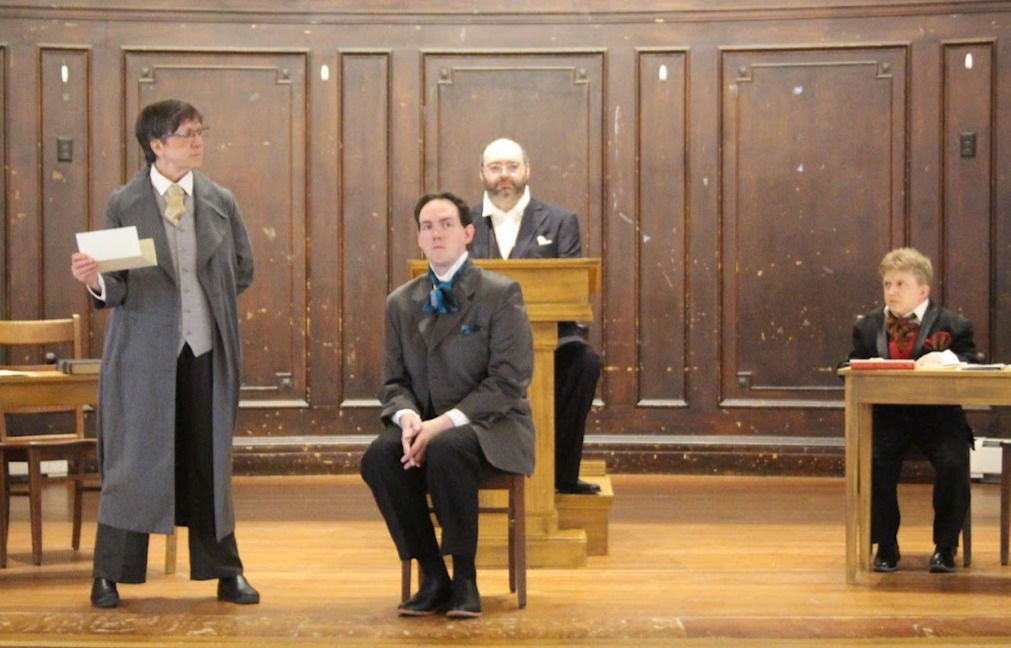
(Cover Photo: Pam Sontag as Solicitor General “Frank Lockwood” interrogating David Allen Prescott as “Oscar Wilde” with Austin Swallow as a “Judge” and Traci Bartlett as “Edward Clarke” in a scene from Moisés Kaufman's "GROSS INDECENCY: THE THREE TRIALS OF OSCAR WILDE" from City on a Hill Arts in Leominster, MA. through June 14, 2025. Photo Credit: Jen Knight)
By Kevin T. Baldwin
METRMAG Reviewer
# 774-242-6724
“In art as in politics there is but one origin to all revolutions – a desire on the part of man for a nobler form of life, for a freer method and opportunity of expression."
- Oscar Wilde

City on a Hill Arts
Presents Moisés Kaufman's
"GROSS INDECENCY: THE THREE TRIALS OF OSCAR WILDE"
Written by Moisés Kaufman
Directed by Jack Crory
Producer Debbie Moylan
Stage Manager Samantha deManbey
Cast Includes: David Allen Prescott as “Oscar Wilde,” Charles Amaral as “Frad Atkins/Sidney Wright,” Traci Bartlett as “Edward Clarke,” Lucas Cardwell as “Lord Alfred ‘Bosie’ Douglas,” Kevin Scott Hall as “Frank Harris/Judge # 2,” Jeremy McMahon as “Edward Carson/Willy Wilde,” Matt Muller as “Charles Parker/Charles Richard,” Kathleen O’Connor as “Charles Gill/Marvin Taylor/Judge # 1,” Pam Sontag as “Frank Lockwood/Queen Victoria,” Austin Swallow as “Marquess of Queensberry/Judge # 3,” David Vaillette as “George Bernard Shaw/Alfred Wood,” Catrina Vear as “Sidney Mavor/oisés Kaufman.”
Additional Creative Team:
Set Design – David Allen Prescott; Costume Design – Valerie Schillawski; Props Coordinator – Samantha deManbey; Marketing Manager – Bethany Johnson.
Performances held at Leominster City Hall, 25 West Street, Leominster, MA.
Performances:
June 6, 2025 through June 14, 2025
(Contact Box Office for Exact Times)
TICKETS:
Free admission with donations welcome
GET TICKETS
COVID 19 PROTOCOLS
Contact Venue for Most Updated COVID-19 Safety Protocols and Information
(Warning: The following review contains spoilers)
City on a Hill Arts takes us to court in the absorbing drama, "GROSS INDECENCY: THE THREE TRIALS OF OSCAR WILDE."
Written by Moisés Kaufman, the two-act play (which feels like it should be performed as three) uses various sources to recall three trials against Oscar Wilde (David Allen Prescott) resulting from his “forbidden” relationship with Lord Alfred Douglas (Lucas Cardwell) and encounters with other men.
The cast recites from these sources which are constantly referenced to maintain proper attribution and context.
However, one gets the sense that if these constant verbal citations were removed from the presentation, the actual runtime of the show would be greatly reduced without losing any of its impact.
"GROSS INDECENCY: THE THREE TRIALS OF OSCAR WILDE" premiered Off-Broadway in 1997 where it enjoyed favorable reviews and an extended run which would lead to further productions on the West Coast, as well.
Kaufman reportedly constructed the play from extensive research and using quotes from "contemporary court documents, newspaper accounts and books by and about Wilde."
Under the steadfast direction of Jack Crory, the City on a Hill Arts' staging takes place in a very basic courtroom setting using both the stage and floor of Leominster City Hall.
While this adds an element of authenticity to the 19th Century courtroom atmosphere, the lack of basic technical elements (specifically specialized lighting and sound) dampens the impact of some of the show’s more emotional moments.
Costuming for the City on a Hill Arts production was well suited to the time period, with creative partial costuming utilized for various quick changes or brief character appearances.
Set in 1890s United Kingdom, it is vital to recall that - not only was homosexuality outlawed, but the very concept was also so far removed from mainstream society such commonly used "colloquial terminology" spoken today (i.e. the word “gay”) was nearly a century away from being invented.
In one diatribe, though, Wilde himself alluded to the fact he despised being “categorized” in ANY way, shape or form - feeling such a repugnant exercise imposes an irrational limitation forced upon his very existence.
Whether or not that was his own inflated ego, a forced bravado to show a brave front against his public persecutors, or perhaps even something else, is up to interpretation.
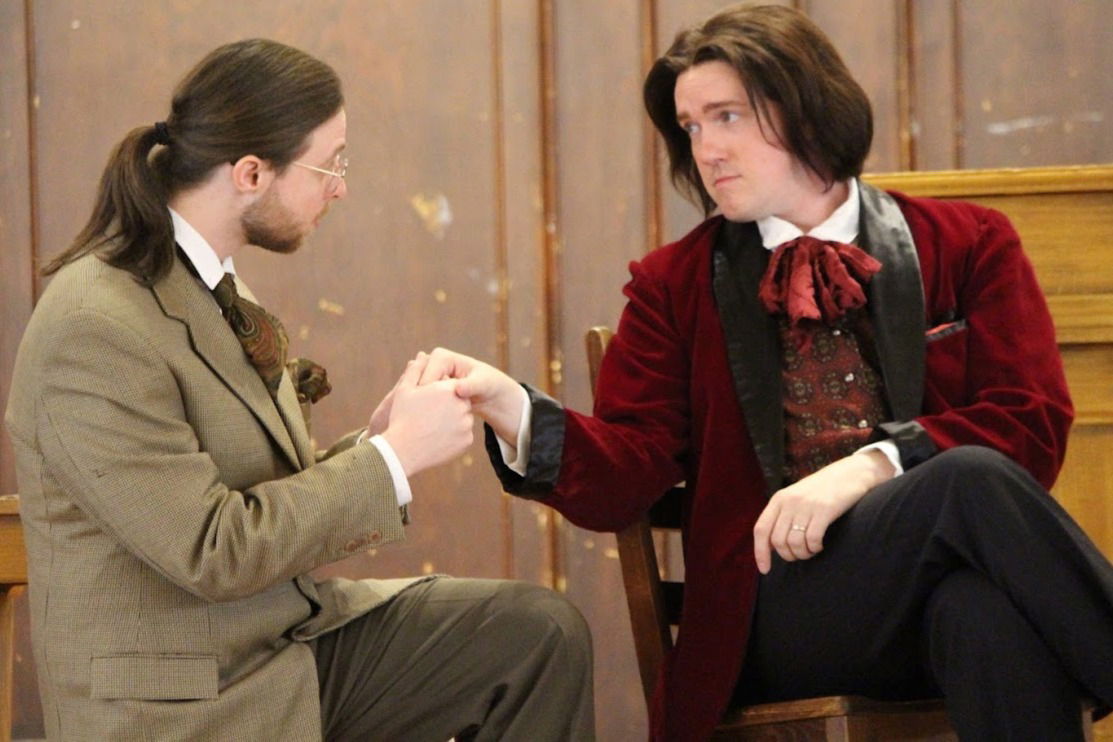
(Photo: Lucas Cardwell as "Lord Alfred 'Bosie' Douglas" with David Allen Prescott as “Oscar Wilde” in a scene from Moisés Kaufman's "GROSS INDECENCY: THE THREE TRIALS OF OSCAR WILDE" from City on a Hill Arts in Leominster, MA. through June 14, 2025. Photo Credit: Jen Knight)
The trials against Oscar Wilde were preceded by one failed private lawsuit Wilde himself brought against a man who had publicly maligned him.
This lawsuit for criminal libel would be the first of the "THREE TRIALS OF OSCAR WILDE."
What stimulated events was Wilde’s relationship with young Lord Alfred 'Bosie' Douglas, which was condemned and publicly maligned by Douglas's father, the Marquess of Queensberry (Austin Swallow).
Wilde sued Bosie’s dad for statements he had made accusing Wilde of “sodomy” (then punishable by imprisonment to a place where presumably more sodomy was ironically practiced).
Wilde was charged with and brought to a second trial for "committing acts of GROSS INDECENCY with other male persons.”
Wilde now found himself on trial for these rumored acts of "GROSS INDECENCY" and - implicitly - for his unique vision of art (and life) that violated Victorian decorum.
The cast authentically represents participants associated with the trials, including barristers such as Wilde’s own frustrated attorney, Edward Clarke (frustrated by his own client, as ably portrayed by Traci Bartlett) and Edward Carson (played with equal aplomb by Jeremy McMahon) who made it his mission to destroy Wilde.
Carson made Wilde seem morally bankrupt, a depraved debauchee who seduced “naïve young men” (suggesting Douglas was one of the many Wilde “preyed upon”) into “a life of homosexuality” by offering them lavish presents and making promises of bringing them fame and fortune.
Conversely, McMahon later portrays Willy (aka "Willie") Wilde, Oscar’s supportive brother (with Pam Sontag as their mother, Speranza) with a convincing Irish brogue (whereas Oscar is usually portrayed without such an accent, purportedly having “shed it” so he could blend in with English high society).
The Wilde family sought to protect and support Oscar at his most vulnerable, as Oscar helplessly watched his life brought to its complete ruination.
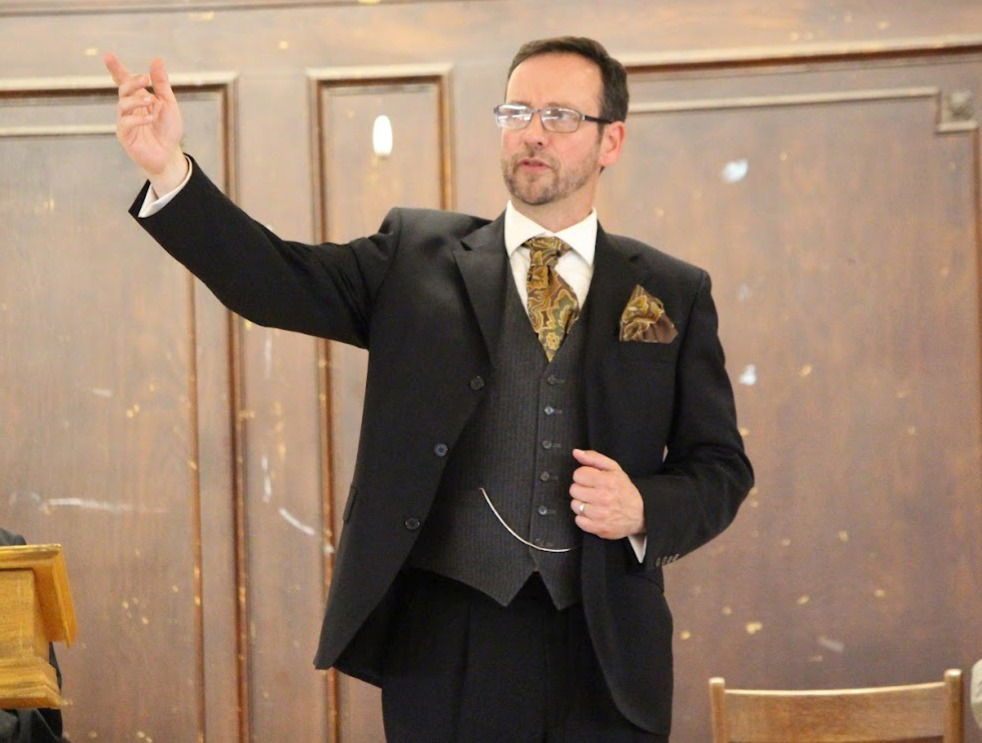
(Photo: Jeremy McMahon as "Edward Carson" in a scene from Moisés Kaufman's "GROSS INDECENCY: THE THREE TRIALS OF OSCAR WILDE" from City on a Hill Arts in Leominster, MA. through June 14, 2025. Photo Credit: Jen Knight)
Throughout "GROSS INDECENCY: THE THREE TRIALS OF OSCAR WILDE" what makes the Kaufman story structure work (as it is less than an actual "script" and more a compilation of quoted resources), it is Prescott's complete conviction to the embodiment of Oscar Wilde.
Wilde is not some fictional character. He was a human being...although by all accounts it does appear that he was certainly larger than life.
Yet, in Prescott's truly unrelenting portrayal, he not only showcases Wilde's undisputed brilliance, but also his undisputed humanity, a humanity that came with a certain heightened arrogance, insufferability (in that he did not "suffer fools" well) and, above all, his emotional vulnerability, especially when it came to young "Bosie."
Similarly, in an exemplary sympathetic performance by Cardwell, Douglas in his own words professes his feelings toward Wilde, emphatically recounting his time with him.
It becomes apparent “Bosie” was not a supposed victim but was, in fact, a kindred spirit of a man trying to live an incredibly honest life sexually in a time that would deny him this...and all others seeking such honesty.
Douglas comes across as a man beyond his years and well outside the time in which he was unfortunate to live.
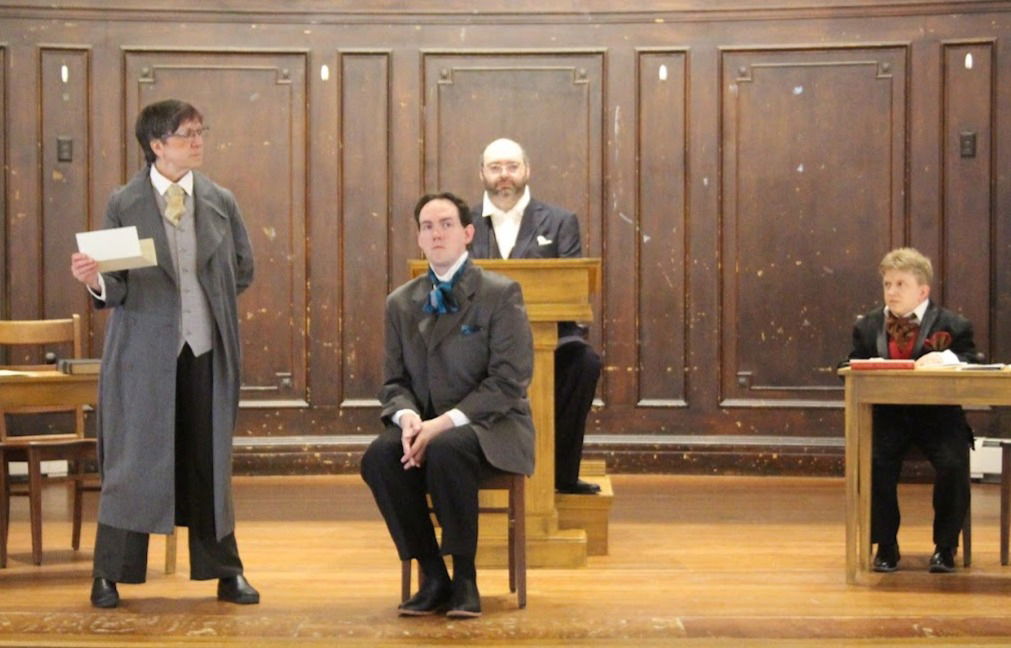
(Photo: Pam Sontag as Solicitor General “Frank Lockwood” interrogating David Allen Prescott as “Oscar Wilde” with Austin Swallow as a “Judge” and Traci Bartlett as “Edward Clarke” in a scene from Moisés Kaufman's "GROSS INDECENCY: THE THREE TRIALS OF OSCAR WILDE" from City on a Hill Arts in Leominster, MA. through June 14, 2025. Photo Credit: Jen Knight)
While not presuming this pedestrian reviewer could ever put words as succinctly or as eloquently as Wilde, one can almost hear Wilde laughing from beyond the grave sarcastically putting forth “My, how far society has come.”
Carson impugned Wilde's works as morally repugnant and designed to corrupt the upbringing of young men.
Even despite his supporters such as Wilde’s contemporary, legendary author George Bernard Shaw (whose words are conveyed by David Vaillette) the second and third trials against Wilde would ultimately change the trajectory of Wilde’s life forever.
"GROSS INDECENCY: THE THREE TRIALS OF OSCAR WILDE" - which continues at Leominster City Hall until June 14th - recalls where we once were on the subject matter discussed, lets us know just how far we have come…then, most importantly, it reminds us that we still a very, very long way to go.
GET TICKETS
Approximately two hours, 30 minutes with one intermission.
Kevin T. Baldwin is a member of the American Theatre Critics Association (ATCA)
@MetrmagReviews
@Theatre_Critics
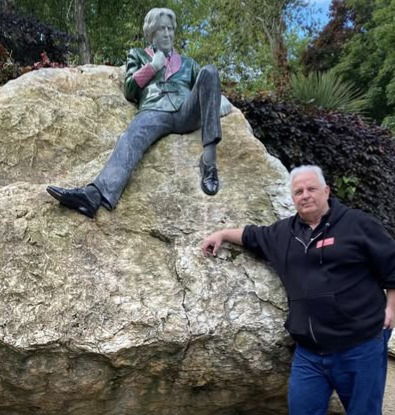
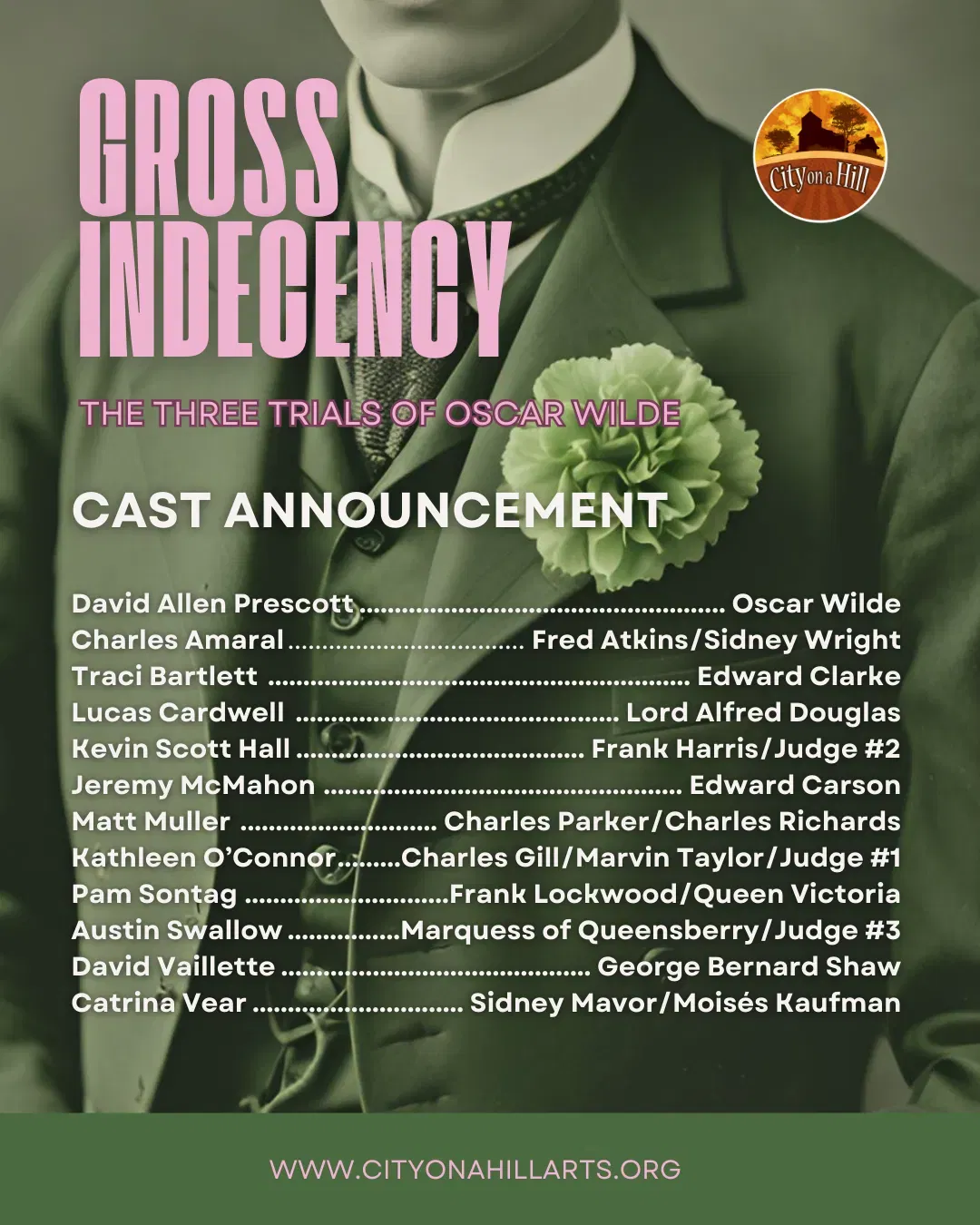
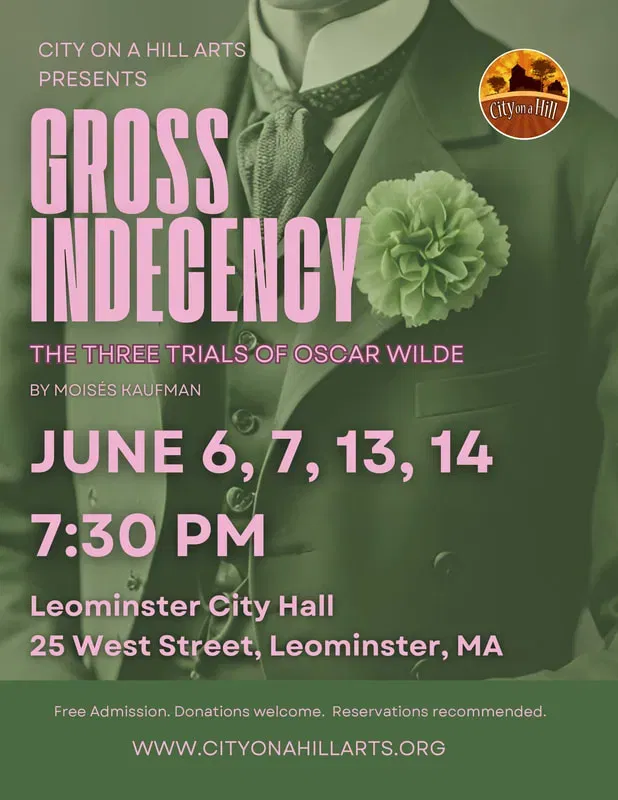
ABOUT THE SHOW
In 1895, Oscar Wilde brought a libel suit against a man who had publicly maligned him.
Within a year, Wilde found himself on trial for acts of "GROSS INDECENCY" and - implicitly - for a vision of art that outraged Victorian propriety.
In this stunning work of theater, Moisés Kaufman turns "THE THREE TRIALS OF OSCAR WILDE" into a riveting drama that weaves together courtroom transcripts, Wilde’s writings, and the words of his contemporaries.
"GROSS INDECENCY" unveils the full range of Oscar Wilde’s genius and frailty while laying bare the hypocrisy and repression of his society.

ABOUT CITY ON A HILL ARTS
CITY ON A HILL (COH) produces works of art that explore the intersection of faith, spirituality, and culture, fostering in each of us a more just and loving response.
70 Foster Road
Ashby, MA. 01431
# 978-906-5081


